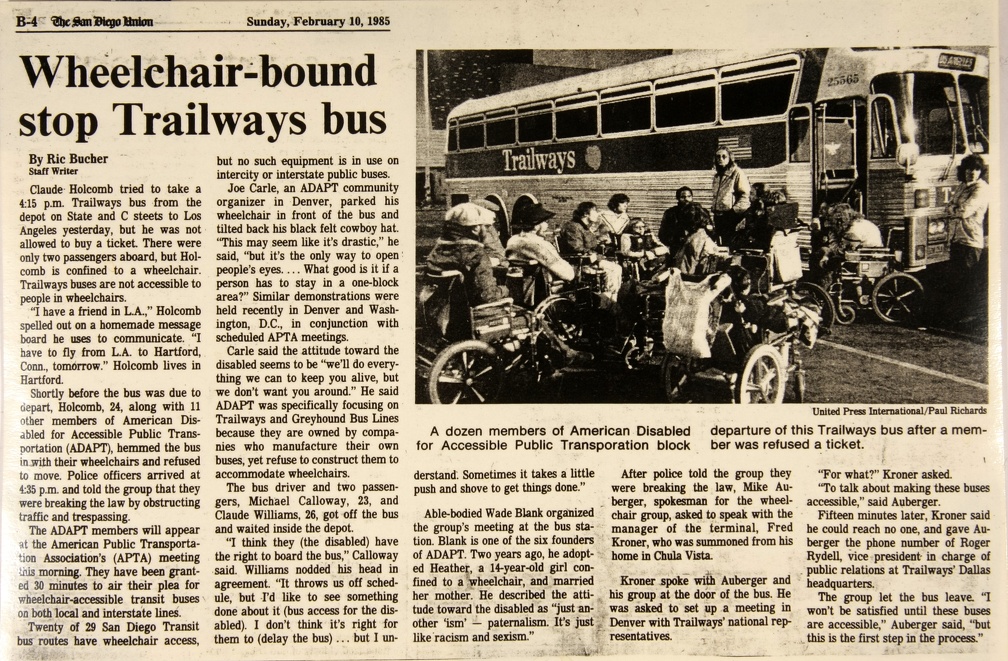- Vali keelAfrikaans Argentina AzÉrbaycanca
á¥áá áá£áá Äesky Ãslenska
áá¶áá¶ááááá à¤à¥à¤à¤à¤£à¥ বাà¦à¦²à¦¾
தமிழ௠à²à²¨à³à²¨à²¡ ภาษาà¹à¸à¸¢
ä¸æ (ç¹é«) ä¸æ (é¦æ¸¯) Bahasa Indonesia
Brasil Brezhoneg CatalÃ
ç®ä½ä¸æ Dansk Deutsch
Dhivehi English English
English Español Esperanto
Estonian Finnish Français
Français Gaeilge Galego
Hrvatski Italiano Îλληνικά
íêµì´ LatvieÅ¡u Lëtzebuergesch
Lietuviu Magyar Malay
Nederlands Norwegian nynorsk Norwegian
Polski Português RomânÄ
Slovenšcina Slovensky Srpski
Svenska Türkçe Tiếng Viá»t
Ù¾Ø§Ø±Ø³Û æ¥æ¬èª ÐÑлгаÑÑки
ÐакедонÑки Ðонгол Ð ÑÑÑкий
СÑпÑки УкÑаÑнÑÑка ×¢×ר×ת
اÙعربÙØ© اÙعربÙØ©
Avaleht / Albumid / Märksõnad Denver + blocking a bus
+ blocking a bus + Connecticut
+ Connecticut + refused a ticket
+ refused a ticket 1
1

 ADAPT (193)
ADAPT (193)
The San Diego Union, Sunday, February 10, 1985, B-4 PHOTO by United Press International/Paul Richards: 11 people in wheelchairs sit facing away from the camera, beside a Trailways bus. The group includes Bob Conrad who is closest the bus door, and Beverly Furnice who is closest to the camera. They are looking at Wade Blank, who stands beside the bus and it looks like Mike Auberger is addressing the group. Caption reads: A dozen members of American Disabled for Accessible Public Transportation block departure of this Trailways bus after a member was refused a ticket. [Headline] Wheelchair-bound stop Trailways bus By Ric Bucher, Staff Writer Claude Holcomb tried to take a 4:15 pm. Trailways bus from the depot on State and C streets to Los Angeles yesterday, but he was not allowed to buy a ticket. There were only two passengers aboard, but Holcomb is confined to a wheelchair. Trailways buses are not accessible to people in wheelchairs. “I have a friend in L.A.,” Holcomb spelled out on a homemade message board he uses to communicate. “I have to fly from L.A. to Hartford, Conn., tomorrow.” Holcomb lives in Hartford. Shortly before the bus was due to depart, Holcomb, 24, along with 11 other members of American Disabled for Accessible Public Transportation (ADAPT), hemmed the bus in with their wheelchairs and refused to move. Police officers arrived at 4:35 p.m. and told the group that they were breaking the law by obstructing traffic and trespassing. The ADAPT members will appear at the American Public Transportation Association's (APTA) meeting this morning. They have been granted 30 minutes to air their plea for both wheelchair-accessible transit buses on both local and interstate lines. Twenty of 29 San Diego Transit bus routes have wheelchair access, but no such equipment is in use on intercity or interstate public buses. Joe Carle, an ADAPT community organizer in Denver, parked his wheelchair in front of the bus and tilted back his black felt cowboy hat. “This may seem like it’s drastic,” he said, “but it’s the only way to open people’s eyes. ... What good is it if a person has to stay in a one-block area?” Similar demonstrations were held recently in Denver and Washington, D.C., in conjunction with scheduled APTA meetings. Carle said the attitude toward the disabled seems to be “we'll do everything we can to keep you alive, but we don’t want you around.” He said ADAPT was specifically focusing on Trailways and Greyhound Bus Lines because they are owned by companies who manufacture their own buses, yet refuse to construct them to accommodate wheelchairs. The bus driver and two passengers, Michael Calloway, 23, and Claude Williams, 26, got off the bus and waited inside the depot. “I think they (the disabled) have the right to board the bus,” Calloway said. Williams nodded his head in agreement. “It throws us off schedule, but I’d like to see something done about it (bus access for the disabled). I don’t think it’s right for them to (delay the bus) but I understand. Sometimes it takes a little push and shove to get things done." Able-bodied Wade Blank organized the group's meeting at the bus station. Blank is one of the six founders of ADAPT. Two years ago, he adopted Heather, a 14-year-old girl confined to a wheelchair, and married her mother. He described the attitude toward the disabled as “just another ‘ism’ — paternalism. It's just like racism and sexism.” After police told the group they were breaking the law, Mike Auberger, spokesman for the wheelchair group, asked to speak with the manager of the terminal, Fred Kroner, who was summoned from his home in Chula Vista. Kroner spoke with Auberger and his group at the door of the bus. He was asked to set up a meeting in Denver with Trailways’ national representatives. “For what?” Kroner asked “To talk about making these buses accessible," said Auberger. Fifteen minutes later, Kroner said he could reach no one, and gave Auberger the phone number of Roger Rydell, vice president in charge of public relations at Trailways’ Dallas headquarters. The group let the bus leave. “I won't be satisfied until these buses are accessible,” Auberger said, “but this is the first step in the process.”